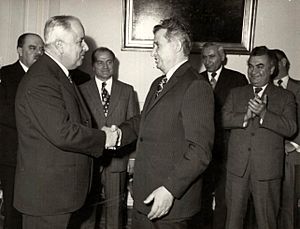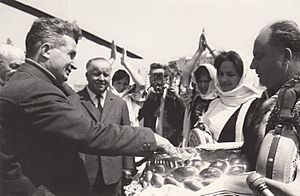Emil Bobu facts for kids
Quick facts for kids
Emil Bobu
|
|
|---|---|

Bobu (left) honored by Nicolae Ceaușescu on his 50th birthday, 1977
|
|
| Born | 22 February 1927 Vârfu Câmpului, Botoșani County, Kingdom of Romania
|
| Died | 12 July 2014 (aged 87) |
| Occupation |
|
| Organization | Romanian Communist Party |
| Criminal charge(s) | Aggravated manslaughter |
| Criminal penalty | 10 years |
| Criminal status | Paroled |
| Spouse(s) | Maria Bobu |
Emil Bobu (born February 22, 1927 – died July 12, 2014) was an important Romanian politician. He held several high-ranking positions in the government during the time when Romania was led by the Romanian Communist Party. He served as the Interior Minister from 1973 to 1975. Later, he was the Labor Minister from 1979 to 1981. He was a very influential person in Romania until the Revolution of 1989.
Contents
About Emil Bobu's Life
Early Life and Education
Emil Bobu was born into a farming family in a village called Vârfu Câmpului, located in Botoșani County. He finished seven grades of primary school. He also attended a special school for employees of the Romanian Railways (CFR). After his schooling, he worked as a lathe operator at a CFR workshop in Iași from 1943 to 1945.
He joined the Union of Communist Youth in 1941. In November 1945, he became a member of the Romanian Communist Party. He worked on youth-related issues for the party in Iași until 1947. In 1948, after the Communist government was set up, he studied in Bucharest to become a teacher for the railway schools.
In 1949, he started studying law at the University of Iași. By 1950, he became a main legal advisor at the Justice Ministry. That same year, he became a military prosecutor in Bucharest. He continued his law studies at the university level from 1954 to 1957. During this time, he also worked in different roles within the Communist Party's central committee.
Rise in Politics
In 1959, Emil Bobu became the head of the local government council in the Suceava Region. He also became a member of the regional party committee. In June 1960, he joined the central committee of the Communist Party. He became a full member in July 1965, shortly after Nicolae Ceaușescu became the leader.
From 1968 to 1973, he was the main leader of the Communist Party in Suceava County. He also led the county council. In December 1972, he became an advisor to President Ceaușescu. He then served as the Interior Minister from March 1973 to March 1975.
Key Government Roles
Emil Bobu became a full member of the Communist Party's important executive political committee (CPEx) in November 1974. He held this position until the 1989 Revolution. From 1975 to 1979, he was a vice president of the Council of State. This was a very important government body.
Starting in 1975, he led the central committee's section for military and legal matters. In 1977, he became the head of the section that handled personnel appointments. He served as the Labor Minister from January 1979 to February 1981. He also led the General Trade Union Federation of Romania.
From January 1980 to May 1982, he was a deputy premier (like a deputy prime minister). He also led the national council for agriculture and food. In June 1982, he became the president of the council for economic and social organization. He held this role until the Revolution. From 1984 until December 1989, he was the general secretary for the Communist Party's organizational matters.
During the last party congress in November 1989, Emil Bobu was known for strongly supporting Ceaușescu. He would often applaud loudly and shout slogans. He sometimes even interrupted Ceaușescu with applause before he finished speaking.
Influence and Power
Emil Bobu was a member of the Great National Assembly from 1961 to 1989. This was like the country's parliament. He represented different counties during this time. In 1981, he received the title "Hero of Socialist Labor." This was a high honor.
Some experts describe him as a very loyal and obedient figure to Ceaușescu. Starting in 1982, he was seen as the second most powerful person after Elena Ceaușescu, the president's wife. They were both responsible for many important appointments of people in the government. Some even said he was "arguably the most powerful Romanian after the two Ceaușescus."
Events of the 1989 Revolution
On December 20, 1989, Ceaușescu sent Emil Bobu and Prime Minister Constantin Dăscălescu to Timișoara. They were ordered to try and stop the protests happening there. However, their mission failed, and they returned to Bucharest the next morning.
On December 22, he flew with Nicolae and Elena Ceaușescu by helicopter to a presidential retreat. Bobu and another official were left there, expecting a second helicopter. After waiting, they left in a car. An angry crowd stopped their car near Găești. Bobu was arrested by the local prosecutor.
Later Life and Family
In February 1990, Emil Bobu was found guilty of a crime related to the Revolution. He was sentenced to a long time in prison. However, in April 1993, the court changed his sentence. He was found guilty of a less severe crime and his sentence was reduced to ten years. In June 1993, he was released from prison.
Emil Bobu passed away in 2014 in a hospital in Bucharest. He was married to Maria Cristian in 1957. She also served as the Justice Minister from 1987 until the 1989 revolution.
Images for kids
 | Sharif Bey |
 | Hale Woodruff |
 | Richmond Barthé |
 | Purvis Young |




